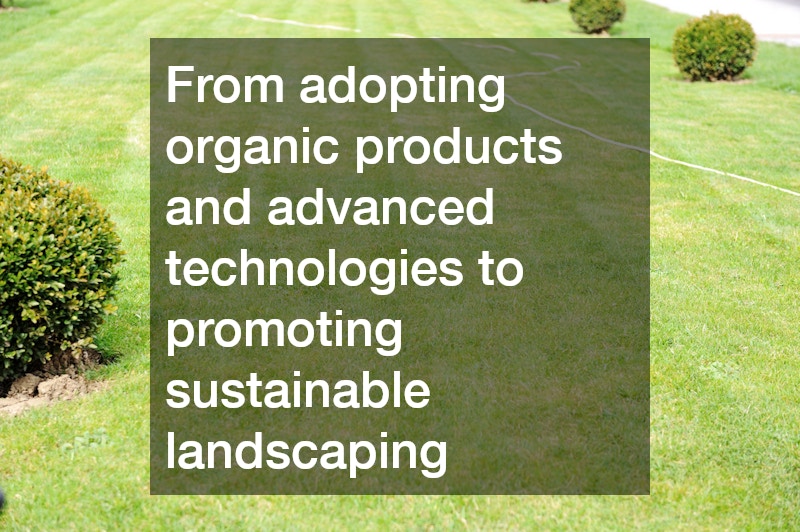In recent years, there’s been a noticeable shift towards eco-friendly lawn care practices as consumers become more aware of environmental impacts. This trend reflects a growing demand for greener yards, driven by homeowners who want sustainable and environmentally responsible outdoor spaces. Companies responding to these demands are pioneering various practices to meet this increasing interest in eco-friendly solutions.
What Techniques Are Lawn Care Companies Using to Promote Greener Yards?
1. Organic Lawn Care Products
One of the primary methods lawn care companies are deploying to create greener yards is the use of organic fertilizers. These products help maintain soil health without the harmful side effects of synthetic chemicals.
Additionally, eco-friendly pesticides and herbicides reduce chemical runoff into water supplies, making them a smart choice for the environmentally conscious.
Organic products support the growth of healthy plants by improving soil microbial activity, which in turn enhances nutrient uptake. They also pose fewer risks to animals and beneficial insects, promoting a more balanced ecosystem. Studies show that lawns treated with organic products are not only lush but also contribute positively to biodiversity.
2. Sustainable Landscaping Practices
Another vital approach is the integration of sustainable landscaping practices such as xeriscaping and the use of native plants. Xeriscaping, a method that reduces or eliminates the need for regular irrigation, is especially beneficial in drought-prone regions. By choosing native plants that require less water and care, companies help conserve resources while supporting local ecosystems.
Xeriscaping involves strategic planning and efficient use of space to achieve an aesthetically pleasing yet low-maintenance landscape. These landscapes are less susceptible to pest invasions, further reducing the need for chemical interventions. Native plants tend to be more adaptive and resilient, which suits the goal of preserving biodiversity.
3. Advanced Lawn Care Technologies
Technology is playing a crucial role in modernizing lawn care for better environmental outcomes. Smart irrigation systems that adjust water use based on weather conditions and soil moisture are becoming increasingly popular. These systems are vital in reducing water waste and ensuring optimal plant health without excess resource use.
Manual and electric mowing tools are also being adopted to decrease carbon emissions associated with traditional gas-powered mowers. These tools are quieter, more efficient, and align with consumer preferences for eco-friendly solutions. Furthermore, advancements in technology offer increased precision and customization, enabling homeowners to maintain healthier lawns.
How Do Lawn Care Companies Ensure Environmental Responsibility?
1. Training and Certification Programs
Lawn care companies are investing significantly in training and certification programs to ensure their practices are environmentally responsible. These programs equip staff with the knowledge necessary to implement best practices in sustainability. Certified teams are better prepared to deliver eco-friendly service, which builds trust with environmentally savvy consumers.
Such educational initiatives focus on the safe application of products, minimizing waste, and promoting biodiversity. Continuous learning plays a pivotal role in keeping up with advances in the field of lawn care sustainability. These certifications also serve as a mark of credibility, attracting clients who prioritize green practices.
2. Waste Reduction Strategies
Waste reduction is a critical component of achieving sustainability goals in lawn care. Many companies now employ composting of lawn clippings, turning waste into nutrient-rich matter that can enhance soil health. Reducing packaging waste by opting for bulk materials and reusable containers is another method being widely adopted.
By implementing comprehensive waste reduction strategies, companies can significantly decrease their environmental footprint. These efforts not only conserve resources but also contribute to cost savings and operational efficiency. An example includes the fact that composted material can serve as a substitute for store-bought conditioners, reflecting an economical approach to sustainability.
3. Partnerships and Community Initiatives
Collaboration with local communities and environmental organizations is essential for advancing sustainability efforts in the lawn care industry. By forming partnerships, companies amplify their impact and drive collective action for environmental causes. Initiatives such as tree planting and educational workshops empower communities to engage in eco-friendly practices.
These partnerships often involve sharing resources and expertise, allowing companies to extend their reach and facilitate meaningful change. Working with community initiatives can also help organizations understand local needs and customize their services accordingly. These collaborations benefit all parties involved, demonstrating a commitment to social responsibility.
Overall, lawn care companies are taking significant steps to revolutionize the industry with greener practices. From adopting organic products and advanced technologies to promoting sustainable landscaping, these businesses are meeting consumer expectations for eco-friendly services. The benefits of these changes extend beyond environmental health, fostering enhanced well-being for homeowners and surrounding communities alike.
.



